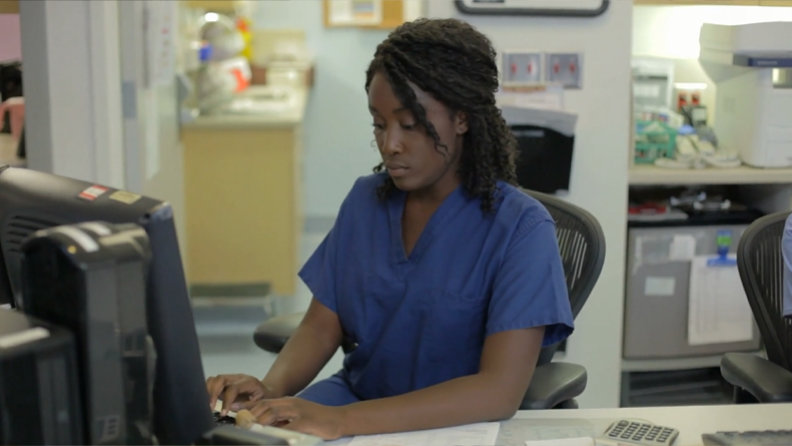Overview
EKG & Phlebotomy Technician Combination Program at the Medical Training Institute of New York provides students with an introduction to the theory, techniques, and roles of a phlebotomist and electrocardiogram (EKG) technician. Students learn phlebotomy skills, including skin puncture, venipuncture, blood collection, and quality assurance. Additional topics include infection control, medical terminology, quality assurance, principles of venipuncture, specimen handling, basic hematology, and anatomy of the venous system. Students learn about the cardiovascular system as it relates to an EKG's performance. Students gain knowledge in basic EKG tracing, rate, rhythm, common heart abnormalities, and the use and function of the EKG machine.
Phlebotomist
The Phlebotomy Technician program will teach students the concepts of Introduction to Phlebotomy & Infection Control, Legal Issues in Healthcare, Introduction to Human Anatomy & Physiology, Phlebotomy Equipment & Supplies, Phlebotomy Procedures, and Phlebotomy Fundamental Essentials. This program is designed for leaner’s who want to advance their career or are interested in starting a career in the medical field to become a phlebotomy technician. This is a comprehensive 80-hour program.
This course prepares students to collect blood for laboratory analysis. Students learn medical terminology, basic anatomy and physiology, infection control safety, communication, and professionalism. Phlebotomy provides opportunities for students to perform routine vein punctures, routine capillary punctures, and special collection procedures. Phlebotomy technicians also perform glucose testing and specimen collection. A phlebotomist is a health care professional specially trained to draw blood. The blood is used to test for conditions based on a physician’s orders, although it can also be used for a transfusion, research, or a donation. Some typical duties of phlebotomists include:
- Greeting blood draw patients and explaining the process to them
- Ensuring patients’ intake paperwork is correct and complete and that their identity is clear
- Calming patients if they are nervous
- For pediatric patients, preparing distractions, special toys, and smaller needles.
- Sterilizing and organizing all equipment according to procedures and protocols
- Conducting the blood draw
- Following all special instructions on patients’ order forms
- Labeling and adequately storing the sample
- Properly disposing of used needles and bandages
- Making sure the patient has no adverse reactions
- Inventorying equipment
- Sterilizing and cleaning the area for the next patient
What Phlebotomists Do
Phlebotomists draw blood for tests, transfusions, research, or blood donations. Some of them explain their work to patients and assist if patients have adverse reactions after their blood is drawn. Phlebotomists typically do the following:
- Draw blood from patients and blood donors
- Talk with patients and donors to help them feel less nervous about having their blood drawn
- Verify a patient’s or donor’s identity to ensure proper labeling of the blood
- Label the drawn blood for testing or processing
- Enter patient information into a database
- Assemble and maintain medical instruments such as needles, test tubes, and blood vials
- Keep work areas clean and sanitary
Phlebotomists primarily draw blood, which is then used for different kinds of medical laboratory testing. In medical and diagnostic laboratories, patient interaction is sometimes only with the phlebotomist. Because all blood samples look the same, phlebotomists must carefully identify and label the sample they have drawn and enter it into a database. Some phlebotomists draw blood for other purposes, such as blood drives where people donate blood. To avoid causing infection or other complications, phlebotomists must keep their work area and instruments clean and sanitary.
Program Summary
Course overview
We are still updating our website with contents. Please check back next time.
Program Schedule Guidelines
We are still updating our website with contents. Please check back next time.
MTI Mission & Goals
We are still updating our website with contents. Please check back next time.
Program Curriculum
We are still updating our website with contents. Please check back next time.
Grading Scale and Methods of Evaluation
We are still updating our website with contents. Please check back next time.
Admission
We are still updating our website with contents. Please check back next time.
Tuition, Books & Technology Fees
We are still updating our website with contents. Please check back next time.
Paying For Your Program
We are still updating our website with contents. Please check back next time.
Refund Policy
We are still updating our website with contents. Please check back next time.
Instructor
We are still updating our website with contents. Please check back next time.
WHAT YOU'LL LEARN

- Medical Terminology
- Introduction to EKG
- Anatomy & Physiology
- Safety and Health
- EKG Practice on Mannequin
- EKG Live Practice
- Past and Present and the Healthcare Setting Quality Assurance and Legal Issues
- Human Anatomy and Physiology: The Circulatory System
- Infection Control, & Universal Precautions Safety, First Aid, and Personal Wellness
- Blood Collection Equipment, Additives, and Order of Draw Live Practice: Venipuncture Procedures: Practice on Mannequin
- Pre-analytical Considerations
- Capillary Puncture Equipment and Procedures Special Collections and Point-of-Care Testing: Practice on Mannequin & Live Practice
- Arterial Puncture Procedures: Practice on Mannequin
- Non-blood Specimens and Tests, Computers and Specimen Handling and Processing, Topics in Phlebotomy
- Career Development Skills and Management Skills
- Phlebotomy and EKG Technician NHA Certification Exam Preparation
WHO WILL BENEFIT

Those Considering Nursing
If your goal is to become a nurse, starting out as an EKG/Phlebotomist is a great opportunity to explore the nursing field. You'll get the chance to work alongside LPNs and RNs in a variety of healthcare settings, earning invaluable experience and skills along the way

Aspiring Medical Professionals
Working as an EKG/Phlebotomist gives many of us our first taste of working in the medical field. You might gain inspiration to continue that career path and get a more in-depth understanding of the medical world. It's okay to share this desire with your interviewer. It shows your dedication to the field and a willingness to learn

Job Stability
Employment of phlebotomists is projected to grow 22 percent from 2020 to 2030, much faster than the average for all occupations.
About 19,500 openings for phlebotomists are projected each year, on average, over the decade. Many of those openings are expected to result from the need to replace workers who transfer to different occupations or exit the labor force, such as to retire.
Employment Hospitals, diagnostic laboratories, blood donor centers, and other locations will need phlebotomists to perform bloodwork.
Blood analysis remains an essential function in medical laboratories and hospitals. Demand for phlebotomists will remain high as doctors and other healthcare professionals require bloodwork for analysis and diagnosis.
In addition to blood analysis, phlebotomists are necessary for blood collection, either at mobile blood centers or dedicated donation centers. These phlebotomists may be especially busy during a health emergency, which can correspond with heightened interest in blood donations.
Total Program Cost:
| Program | EKG & Phlebotomy Technician |
| Hours | 120 |
| Registration Fee | $100 |
| Tuition | $1,400 |
| Technology Fees | $200 |
| Clinical & Lab Fee | $250 |
| Total Program Cost | $2,300 |
Fees
Registration Fee:
A non-refundable Registration Fee of $100 was due during registration to reserve a seat.

Clinical/Lab Fee
Clinical/Lab Fee is used to cover the cost of Liability insurance policy and student lab operations and to provide students with Liability Insurance at clinical rotation internship sites.

Technology Fees:
Technology Fee provides students with Online Learning Resources, the learning management system, and the student portal.

Books:
Students are required to purchase all textbooks on their own. Textbook costs are estimated at $350.00. Required books can be purchased from the school bookstore or online at portal.mtiofnewyork.com/stores

Uniform
Students are required to purchase MTI logo scrubs on their own. MTI logo scrubs can be purchased from the school bookstore or online at portal.mtiofnewyork.com/stores.

Tuition:
Tuition for the EKG & Phlebotomy Technician Program is $2,300.00 for the entire program, with tuition payments due as follows, and the non-tuition fees, are non-refundable once classes have begun (see Refund Policy below):

| Quarter | Cost |
| Prior to Quarter 1 & 2 | $2,300 |



